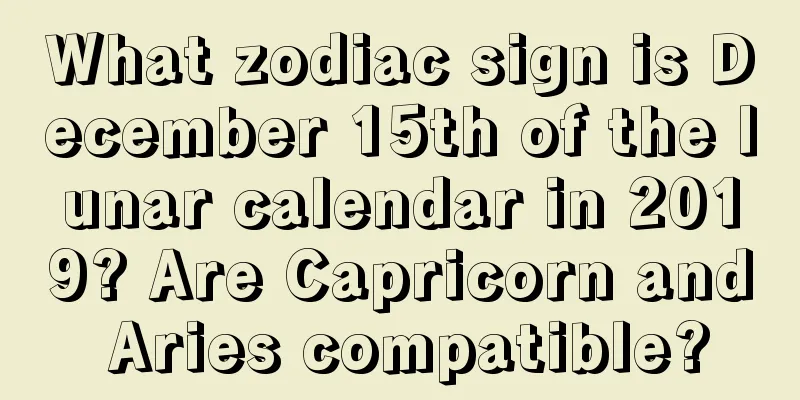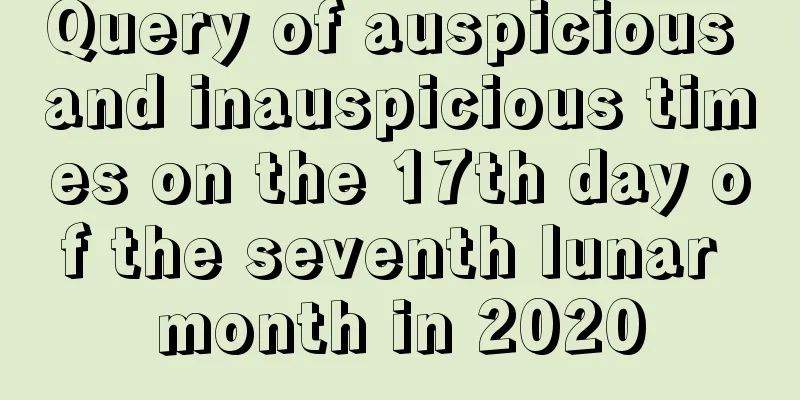Who is Qingming Festival commemorated for? What are the customs of Qingming Festival?

Introduction: Qingming Festival is an important festival. Who is Qingming Festival commemorating? What are the customs of Qingming Festival? Follow the editor to find out! Shuimoxiansheng.com has carefully compiled detailed information about the third month of the lunar calendar in 2019. If you want to know the auspicious and inauspicious days in the third month of the lunar calendar, just go to Shuimoxiansheng.com.Who is Qingming Festival commemorated?Qingming Festival is around April 5th of the Gregorian calendar every year. The origin of the festival is related to commemorating Jie Zitui.According to legend, during the Spring and Autumn Period and the Warring States Period, Chong'er, the son of Duke Xian of Jin, fled into exile to avoid disaster. During his exile, most of the ministers who had fled with him went their separate ways, leaving only a few loyal people, among whom was Jie Zitui. Once, Chong'er fainted from hunger, and Jie Zitui cut a piece of meat from his own leg, roasted it and gave it to Chong'er to eat. Nineteen years later, Chong'er returned to his country and became the monarch, namely Duke Wen of Jin, one of the famous Five Hegemons of the Spring and Autumn Period. After Duke Wen of Jin came to power, he rewarded his ministers who had shared his hardships, but he forgot Jie Zitui. Jie Zitui couldn't stand this scene and left quietly. Someone spoke up for Jie Zitui in front of Duke Wen of Jin. Duke Wen of Jin suddenly remembered the old incident and felt guilty. He immediately sent someone to invite Jie Zitui to the court to receive rewards and official titles. However, after sending people several times, Jie Zitui did not come. Duke Wen of Jin had no choice but to go and invite him in person. However, when Duke Wen of Jin arrived at Jie Zitui's home, Jie Zitui had already hidden in Mianshan (now southeast of Jiexiu County, Shanxi) with his mother on his back. Duke Wen of Jin sent people to search the mountain, but still nothing was found. So, someone came up with an idea and said, why not set fire to the mountain, ignite it on three sides and leave one side, and when the fire started, Jie Zitui would surely come out by himself. Duke Wen of Jin followed his advice. Unexpectedly, the fire burned for three days and three nights, and after it was extinguished, Jie Zitui was nowhere to be found. When they went up the mountain, they found that Jie Zitui and his mother had died hugging a burnt willow tree. Duke Wen of Jin looked at Jie Zitui's body and cried and bowed for a while. When he was ready to bury the body, he discovered that there was a willow tree hole blocked by Jie Zitui's spine, and there seemed to be something in the hole. When he took it out, it turned out to be a piece of clothes with a poem written in blood on it: I cut my flesh and blood to serve you with all my heart, I hope my lord will always be clear and bright. Being a ghost under the willow tree and never being seen is better than being an advisor to the king. If my lord has me in his heart, he will always reflect on himself when he thinks of me. I have no regrets in my grave, and I will continue to work diligently and honestly. Duke Wen of Jin hid the blood letter in his sleeve and built a shrine on the mountain. Duke Wen of Jin also ordered that Mianshan be renamed "Jieshan" in his memory. Later, Duke Wen of Jin designated the day when he set fire to the mountain as the Cold Food Festival, and announced to the whole country that on this day every year, fireworks were forbidden and only cold food was eaten to commemorate Jie Zitui. The next year, Duke Wen of Jin led his ministers to the mountain to offer sacrifices and discovered that the old willow tree had come back to life. He named the old willow tree "Qingming Willow" and announced to the world that the day after Cold Food Festival should be designated as Qingming Festival. What are the customs of Qingming Festival?Qingming Festival customs: worship and tomb sweepingTomb sweeping during Qingming Festival is called "respect for ancestors". The custom has a long history. The Ming Dynasty's "A Brief Account of Scenery in the Imperial Capital" records: "On the Qingming Festival in March, men and women sweep the tombs, carrying jugs, with paper mulberry sticks hung behind sedan chairs and horses, filling the streets with people. Those who worship, pour wine, cry, and weed and add soil to the tombs burn paper mulberry sticks and place paper money on the grave. If there is no paper money in sight, then the grave is an isolated one. After crying, people do not return home, but instead go to fragrant trees and choose gardens, where they sit and get drunk." In fact, tomb sweeping existed before the Qin Dynasty, but it was not necessarily during the Qingming Festival. Tomb sweeping on the Qingming Festival is a practice that began after the Qin Dynasty. It only became popular during the Tang Dynasty. And it has been passed down to this day. The Qingming Festival memorial ceremony should be held in person at the cemetery, but since each family’s economic and other conditions are different, the ways of memorializing the dead are also different. "Burning bundles" is the main form of ancestor worship. The so-called "package", also known as "parcel", refers to the parcel sent from the world of the living to the "underworld" by filial relatives. In the past, paper shops in the south sold so-called "bag skins", which were large bags made of white paper. There are two forms: one is to use a woodcut version, with the Sanskrit transliteration of "Nirvana Sutra" printed around it, and a lotus seat tablet printed in the middle, on which the name of the deceased is written, such as: "The late Mr. Zhang Fujun, whose name is Yunshan". It is both a postal package and a tablet. The other type is a plain wrapping cloth without any pattern printed on it. There is only a blue label in the middle with the name of the deceased written on it. Also used as the main card. There are many kinds of paper money in the bundle. Qingming Festival customs: outing Also called spring outing. In ancient times, it was called Tanchun, Xunchun, etc. During the Qingming Festival in April, spring returns to the earth and nature is full of vitality. It is a great time for an outing. The Chinese people have long maintained the custom of outing during the Qingming Festival. Qingming Festival Customs: Swinging This is the custom of Qingming Festival in ancient China. Wang Renyu of the Five Dynasties wrote in "The Remaining Stories of Kaiyuan and Tianbao" that "During the Cold Food Festival, a swing was erected in the Tianbao Palace for the concubines to play and have fun. The emperor called it the play of the half-immortals, and the people in the capital called it that as well." Wen Yanbo, the prime minister of the Song Dynasty, wrote in his poem "Passing by Dragon Gate on the Cold Food Day" that "beside the bridge, willow trees hang down green threads, and there are many swings with colorful ropes." A swing means moving by pulling on a leather rope. It has a very ancient history. It was originally called Qianqiu, but later it was changed to swing to avoid taboos. In ancient times, swings were mostly made of tree branches as frames, tied with colorful ribbons. Later it gradually developed into a swing with two ropes and pedals. Swinging can not only improve health, but also cultivate courage. It is still loved by people, especially children. Qingming Festival Customs: Planting Trees Around the Qingming Festival, the spring sun shines and the spring rain falls, so the survival rate of planted seedlings is high and they grow fast. Therefore, China has had the custom of planting trees on Qingming Festival since ancient times. Some people also call Qingming Festival "Arbor Day". The custom of planting trees has been passed down to this day. The custom of planting trees on Qingming Festival originated from the custom of wearing willows and planting willows on Qingming Festival. There are three legends about wearing willows and planting willows on Qingming Festival. The oldest legend says that it was to commemorate Shennong, the ancestor who taught people how to farm, and later it developed into a meaning of praying for longevity. A later legend is related to Jie Zitui. It is said that when Duke Wen of Jin led his ministers to the mountain to pay tribute to Jie Zitui, they discovered that the old willow tree that Jie Zitui had leaned on before his death had come back to life, so they named the old willow tree "Qingming Willow". A later legend has it that Emperor Taizong of Tang gave willow wreaths to his ministers as a sign of blessing and to ward off epidemics. Qingming Festival customs: flying kites Flying kites is also a favorite activity among people during the Qingming Festival. During the Qingming Festival, people set off fireworks not only during the day but also at night. At night, strings of colorful lanterns are hung under the kite or on the wind-stable pull line. They look like twinkling stars and are called "magic lanterns." In the past, some people would cut the strings after releasing the kites into the blue sky and let the breeze carry them to the ends of the earth. It was said that this would ward off disease and disaster and bring good luck. Qingming Festival Customs: Cuju Ju is a leather ball made of leather and stuffed with hair inside. Cuju is kicking the ball with the feet. This was a favorite game during the Qingming Festival in ancient times. According to legend, it was invented by Huangdi and its original purpose was to train warriors. Playing polo is also one of the activities during the Dragon Boat Festival. Polo is a game in which one hits a ball with a stick while riding on a horse. It was called Jiju in ancient times. In the Three Kingdoms' poem "Famous Capitals" by Cao Zhi, there is a line "Continuously hitting the ground with balls". "Xijing Zhi" records that the Liao Dynasty regarded playing polo as a traditional festival custom, and played polo on the Dragon Boat Festival and Double Ninth Festival. "History of Jin Dynasty: Rituals" also records that the Jin people played ball during the Dragon Boat Festival. There was a "ball-playing music" dance troupe in the Song Dynasty. Polo was still popular in the Ming Dynasty. The "Continued Comprehensive Examination of Literature and Art·Examination of Music" records that Emperor Chengzu of the Ming Dynasty went to the East Garden several times to play ball and shoot willows. The long scroll "Emperor Xuanzong Enjoying Pleasure" in the Ming Dynasty depicts the scene of Emperor Xuanzong enjoying polo. Wang Zhi, an official at that time, wrote a poem about watching people playing ball on the Dragon Boat Festival: "A jade-bridled horse worth a thousand gold, and a ball carved with seven treasures. The horse flies like lightning, and I lie down and feel the stars flowing. Three victories are achieved in the scorching sun, and I am happy to win the first prize. Celebratory clouds follow the horse's feet, and linger around the east end of the hall." There is also a tradition of people playing ball on horseback in front of the Baiyun Temple in Beijing. Polo was still played in the Temple of Heaven area during the Qing Dynasty, but it disappeared after the middle of the Qing Dynasty. Starting in 1965, antique polo appeared in Xi'an, making this ancient sport reappear in China after being extinct for many years. Fortunes in life can be good or bad, and calculating the direction of your fortune in advance can help you nip problems in the bud, reverse unfavorable situations, and make your life smoother and brighter. To calculate your life fortune over the next ten years, please click on the [Premium Calculation] button below for accurate calculation. I wish you all the best in your life! |
<<: Is today, February 29, 2019, the Cold Food Festival, an auspicious day?
Recommend
What is the fate of a child born on August 24th of the lunar calendar? How’s your financial luck?
Introduction: The birth of a child is a happy thin...
What is the auspicious time on August 26, 2018? Check the auspicious and unlucky time
It is the eighth month of the lunar calendar, the...
May 1, 2020 Labor Day·Can I travel abroad during the epidemic?
Introduction: There are 5 days of holidays for Lab...
Should we welcome the God of Wealth on the fifth day of the first lunar month?
Should we welcome the God of Wealth on the fifth d...
Zodiac fortune + birth fortune (people born on Labor Day in 1993, the zodiac sign of Rooster)
People of every zodiac sign have different destiny...
What is the fate of a boy born on the ninth day of the tenth month of the lunar calendar? Are you lucky with money?
Introduction: The birth of a child is one of the h...
Is July 5, 2018 a suitable date to open a new store?
The seventh month of the lunar calendar is approa...
Is May 25th of the lunar calendar 2021 a suitable date for engagement? Is the fortune for today good?
The fifth month of the lunar calendar, which is th...
Is the Great Cold in 2018 suitable for health preservation? What kind of food do you usually eat?
Most Chinese festivals are inseparable from eating...
Query the auspicious and unlucky time of the 14th hour of August 2017, and the auspicious and unlucky time of the 14th hour
August always brings people the sweet scent of os...
Can the funeral be held on March 23rd of the lunar calendar in the Gengzi Year of 2020? Is it an auspicious day?
Can the funeral be held on March 23rd of the lunar...
Is it good for people born in the twelfth month of 2017? Is it your destiny to be rich and powerful?
Introduction: Every child is born in a different m...
Will a puppy baby born on the Double Ninth Festival on September 9, 2018 have a good life? How to name a baby born on the Double Ninth Festival?
Introduction: Different people are born with diffe...
Can I get married on the third day of the seventh lunar month in 2019? Can I get engaged and hold a wedding?
The wedding date is generally chosen by the paren...
Is it okay to move on the sixth day of the seventh lunar month in 2017? Is it suitable to hold a housewarming party?
Which days in the seventh month of the lunar calen...









